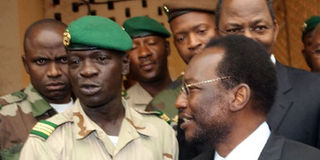Mali's future interim president meets coup leader

Mali's speaker of parliament Dioncounda Traore (Right, with glasses) stands next to Captain Amadou Sanogo (2nd Left) after they met on April 9, 2012 at the Kati military barracks outside Bamako. The man overseeing Mali's return to democratic rule met Monday with the army captain who seized power with other soldiers on March 22. Photo/AFP
The man set to be sworn in as Mali's interim president to oversee the country's return to democratic rule met Monday with the army captain who seized power with other soldiers on March 22.
Dioncounda Traore, who is currently Mali's speaker of parliament, arrived at a military camp near the capital Bamako to meet with Captain Amadou Sanogo.
The meeting, in Sanogo's offices, lasted for about an hour.
Afterwards, Sanogo told reporters the meeting "went well", adding that more information would be released soon.
Other officials, including Burkina Faso's Foreign Minister Djibrill Bassole and Ivory Coast African Integration Minister Adama Bictogo, who are acting as mediators, declined to comment.
The meeting came the day after Amadou Toumani Toure, who was ousted in the coup, formally resigned Mali's presidency.
Under the transition deal, the move means Sanogo must prepare to step down and allow for Traore to be sworn in as interim president, but it was not immediately clear exactly when that would happen.
Traore will be tasked with organising elections, if possible within 40 days, according to the agreement.
Transitional authorities must address the situation in the north of the country, which since the coup has been taken over by Tuareg rebels, outlaws and Islamic extremists who exploited the political and military disarray to sweep across the vast desert region.
An interim prime minister will also be appointed to head "a government of national unity", according to the terms of the deal which the West African ECOWAS bloc forced on Mali's military rulers in exchange for the lifting of sanctions.
A Burkina Faso official said it was hoped the first cabinet meeting could be held "before Friday".
Meanwhile the humanitarian crisis in the north of the country, cut off from the rest of the world, was growing worse, witnesses and non-governmental organisations warned.
"The situation in the three northern region is dramatic. There are no more hospitals and hunger is growing ... The international community must intervene," member of parliament Abdou Sidibe told AFP.
On the military front, ECOWAS is threatening to intervene to put down the northern rebellion by the Azawad National Liberation Movement (MNLA), which is said to comprise some 500 fighters, nearly all of them Arabs from the Timbuktu region.
The MNLA led by Tuareg rebels last week proclaimed the independence of the northern region they call Azawad, a move rejected by the international community as well as by the Islamist Ansar Dine, which controls some towns.
And an Al-Qaeda dissident group on Sunday claimed it was behind the kidnap of seven Algerian diplomats Thursday in the northern Mali town of Gao.
The Movement for Unity and Jihad in West Africa (MUJAO) said it had seized the diplomats after rebels overran Gao, along with the towns of Kidal and Timbuktu.
MUJAO in December also claimed the kidnap in October in western Algeria of two Spaniards and one Italian aid workers.
MUJAO is said to have broken off from the main group, Al-Qaeda in the Islamic Maghreb (AQIM), in order to spread jihad to west Africa rather than confine themselves just to the Maghreb or Sahel regions.
The only French national present in Gao when it fell told Monday's edition of Le Figaro newspaper how she managed, with the help of local residents, to escape across the desert to Algeria.




